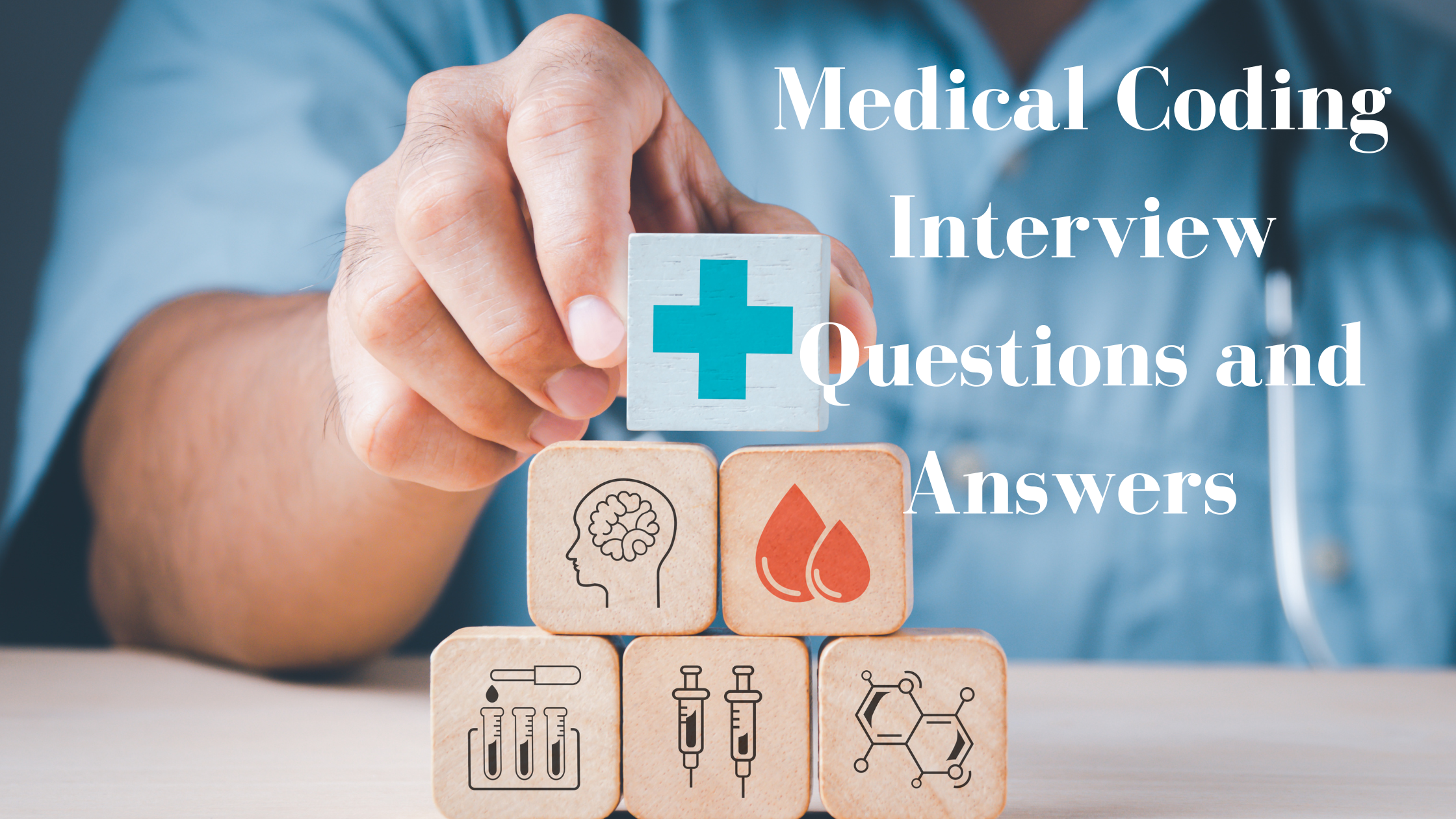Medical Coding Interview Questions and Answers for Freshers
Medical coding is an essential part of the healthcare industry. As a coder, you will be responsible for entering medical information into a database, and this information will then be used to provide accurate and timely patient care.
Medical Coding Interview Questions and Answers Download
In this post, we have compiled a list of questions that are commonly asked during medical coding interviews, as well as answers that will help you prepare for the interview. So whether you’re a fresher looking for a medical coding job, or an experienced coder who is looking to update your skills, read on to get started.
Medical Coding Interview Questions and Answers List Updated
- What is medical coding?
Medical coding includes the process of assigning medical diagnoses and procedure information to standard numerical codes. Medical coding professionals are employed in a wide variety of medical settings, where they are involved in the billing process of patient care and medical claims.
- How to remain advanced in medical coding?
There are many ways to stay current with changes in the medical coding industry, but the best way is to join organisations and attend meetings. These groups offer the industry’s latest technologies, trends, and in most cases, advanced training.
- What is the reason for choosing medical coding?
Medical coding is a fast-growing career field. Medical coders are responsible for coding patient records for insurance reimbursement schedules. Medical coders work with organisations in the healthcare industry to ensure that the records sent to insurance agencies are coded correctly and that the reimbursement is coded properly.
- Why is medical coding essential?
Medical coding is a professional certification program. It is an important part of the healthcare system that links the patient’s medical history and patient encounter to the medical provider’s medical chart. They use coding systems to provide billing and reimbursement for medical procedures.
- What abilities should a medical coder have?
Medical coding is a trending occupation that is in high demand. The skills required to become a medical coder are not very demanding. You need to be good in maths and have exceptional spelling skills. You should also be very good at English and be able to communicate with different doctors and patients.
- What expressions are used in medical coding?
The language used in coding is different from the language used for the rest of the profession. This is because the codes need to be precise and concise so that they can be easily understood and found by other healthcare professionals.
- How to update coding errors?
In order to update a coding error, one should first determine the problem. If it is a minor problem, it can be fixed by updating. If it is a major problem, the ACO will likely have to pay a penalty, which is why the ACO is likely to be the one to notify the provider.
- How to stay up to date with coding changes and updates?
Medical coding is an ever-changing field. There is a constant need to ensure that all coders keep up with the changes. Take advantage of various resources including professional organizations, training programs, and national conferences to stay informed. The coder should also read and stay informed through government sources, trade publications, and medical journals.
- How to handle coding errors?
Medical coding errors can be difficult to handle. It is important that you approach the issue with a clear head and not succumb to emotions. The first step to take is to report the problem. If it is a coding error made by your employer, you can report the problem through their internal procedure. If a coding error is made by a third party, you can report the problem to the contractor or the organisation that ordered the service from the third party.
- How to handle time-sensitive coding tasks?
The secret to handling time-sensitive medical coding tasks is to set deadlines and make it a point to meet them. So write down the due date of your medical coding tasks and post it somewhere close to where you work. Creating a deadline helps to stay focused and submit work before or on it.
- What do you think makes medical coding a rewarding career?
Medical coding can be a rewarding career for those who are detail-oriented and have a passion for helping others. Medical coders play a vital role in the healthcare system, and their work can directly impact the quality of patient care.
- What do you think sets medical coding apart from other forms of coding?
Medical coding is unique because it requires a deep understanding of both medical terminology and coding systems. This combination of knowledge allows medical coders to accurately translate the treatments and procedures documented in a patient’s medical record into the appropriate code.
- What do you think are the challenges involved in medical coding?
One of the main challenges involved in medical coding is keeping up with the ever-changing coding guidelines and updates. Medical coders also need to be able to code for a variety of different medical specialties, which can be challenging.
Some common mistakes in medical coding can be incorrect coding of diagnosis and procedure codes, incorrect use of modifiers, and failure to properly document medical necessity.
- How would you avoid medical coding mistakes?
To avoid coding mistakes, it is important to double-check your work, keep up with coding guidelines, and consult with a supervisor or other experienced coder when needed.
- What are the practical uses of Medical Coding?
It is used to record and track patient medical information and to bill for services rendered. Without medical coding, it would be difficult to keep track of patient care and ensure that proper reimbursement is received. Medical coding is also used to track the outcomes of treatments and to research trends in healthcare.
- How do you handle difficult coding tasks?
As a medical coder, you will occasionally encounter coding tasks that are more difficult than others. If you are still having trouble, consult with a more experienced coder or your supervisor. They may be able to offer some helpful tips or point you in the right direction. Coding can be challenging at times, but there is always someone available to assist you if necessary.
- What are different clinical billing codes?
- Diagnostic code
- Drug Code
- Geographic code
These are used as symptom codes to diagnose the disease
- What are ICD codes?
It means doing the International Classification of Diseases. The WHO Code is to be administered. It is to describe the causes of injury, illness, and death.
- What are write-offs and clinical coding?
The write-off is very important in medical coding. Because it helps in billing management. It is important to write and clarify daily.
- What are your thoughts on the future of medical coding?
I believe that medical coding will continue to grow in importance as healthcare becomes increasingly complex. With the ever-growing volume of medical data, this data must be coded accurately and efficiently to ensure proper reimbursement and to support research efforts.
- What do you think are the most important qualities of a successful medical coder?
There are a few qualities that are essential for a successful medical coder. You need to have a strong interest in the healthcare field and a desire to help others. You need to have great attention to detail and be able to work accurately and efficiently.
- What training and certificate are needed for medical coding?
Medical coding training is conducted via diploma, certificate or degree. The diploma program is very short and the cost is low. Some colleges also offer it online. In contrast, a certificate program can take up to a year and the cost is higher. While both diploma and certificate programs focus on medical coding, the diploma program may cover more job skills.

- What steps to prevent coding errors?
Medical coders are at the Centre of the medical billing process. They provide essential services that help determine the revenue and profitability of healthcare organizations. Medical coders ensure that bills are submitted in a timely manner, avoiding delays and an adverse financial impact on the company. These coders also often work in tandem with medical billers, who are responsible for the payment collection aspect of the medical billing process.
- How to ensure accuracy when coding?
Medical coding is a very important part of the medical billing process. If a medical billing agency has a professional medical coder doing the work, accuracy is almost a foregone conclusion. Medical billing agencies should have a process in place for ensuring accuracy throughout the entire coding process. The medical billing agency should implement a quality control process to ensure that coders are not just accurate, but are also using procedures that are up-to-date and relevant. It is also an area that has sometimes been susceptible to errors if the medical billing agency doesn’t have a quality control process in place.
Medical Billing and Coding Interview Questions and Answers
- What are HCPCS codes?
It means healthcare common procedure system. These codes are used for processing of health insurance. It is a collection of standardised codes which represent medical procedures, products, supplies and services. It is further divided into two subsystems, Level I and Level II.
- When are HCPCS modifiers used?
HCPCS modifiers are very helpful in providing additional information. When we need some additional information about the medical treatment, we use HCPCS modifiers. These codes are used for specifying the area of the body, the reason for discontinuation of treatment and number of procedures performed in a single visit.
- How many phases are there in medical coding?
There are three phases in medical coding. These are:
- Abstraction
- Assignment
- Review
They are used on a day to day basis and form an important part of a medical coder job.
- What is the abstraction phase in coding?
Abstraction is the determination of a patient’s ailment with the help of a patient’s record and reports. The assignment phase has two parts:
- Finding appropriate code from the data
- Entering the code into the system
- What are DRG codes?
DRG means Diagnostic related groups that are used for classifying hospital cases into 500 sets. They store all the information from the admission of patients to discharge. It is very important to get these codes right because many insurance companies only consider the DRG codes when they go to pay.
- What is CPT coding?
CPT stands for Current procedural terminology. It is a uniform language for coding medical services and procedures. It is offered to doctors and health care professionals. They are an important part of the billing process. They create a full picture of the medical process for payers.
- What is the role of a medical coder?
Medical coders can work at different places but hospitals are the right places for them. Some insurance companies also hire medical coders and also employee medical coders to handle patient claims. Some law firms also hire medical coders to identify fraud billing. A medical coder is the one who translates patient details from his reports, procedures etc.
- What are medical coding errors?
The medical coding errors include:
- Sloppy documentation
- Hurried intake/missed information
- Unbundling
- Up coding
- Under coding
- Duplicate billing
- Overusing the modifiers
- Improper infusion and hydration does reporting
- What is the cause and impact of medical coding errors?
Inadequate medical documentation is one of the main causes of medical coding errors. These coding errors can cause serious impact. As the foundation of every practice of medical coding is to provide quality patient care. These errors can lead to frustration, confusion and potential breakdown.
- What are three ways to organise bill paying?
The three ways to organise bill paying are:
- Paper
- Folder or Binder
- Digital bill paying
- What is “J” code in medical coding?
It is a part of HCPCS code set which represents medical substances for billing and reporting.
For Example: If you want to show that a patient has received an anaesthetic drug by using J code, then it is represented in a way like J followed by four numbers JXXXX.
- In medical coding, which one is serious red or blue?
For the use of code designations, there are no standard definitions or conventions. But , blue code refers to a cardiopulmonary arrest at many hospitals, however it doesn’t necessarily mean the same thing everywhere.
- What is EOR?
The full form of EOR is Explanation of Review. Whenever a payer pays a bill, health care professionals have to give the EOR of the bill. It is given usually when the amount paid by the payer differs from the amount in the bill.
- What is the review phase in medical coding?
The codes which have been assigned are cross checked for accuracy if they explain the treatment used according to the condition of the patient. Review is necessary as it helps to ensure that there are no errors in documents before the submission of data.
- What are the types of coding?
The types of medical coding are:
- HCPCS and its three levels
- ICD-9 and ICD-10
- CPT
The expert medical coders have great command, knowledge and experience in three coding systems.
- What are the key steps in medical coding?
The six key steps in medical coding are:
- Abstract the documentation
- Ask questions if necessary
- Code the diagnosis that has been performed
- Then code the procedure
- Confirm medical necessity
- Check your codes twice
- What are the components of medical coding?
The components are:
- Variables
- Data structure
- Control structure
- Syntax
- Tools
- Which ICD is used?
ICD is an important part of medical coding. It helps to maintain the data. Nowadays, generally ICD-11 is used which originated in the 19th century.
- As per your opinion, What do you think is the most difficult aspect of providing accurate medical coding?
Knowing the thousands of codes from numerous code sets that are updated on a regular basis is the most difficult aspect of numerical coding.
- What happens if a medical coder makes a mistake?
If a medical coder made a mistake then he had to deal with frustrations or may be partially paid. It causes a lot of disturbance to the data stored and might be resulting in severe loss.
- Mention how wound repair is classified?
Wound repair is classified into three types in medical coding. They are :
- Simple
- Intermediate
- Complex
- What do you know about upcoding?
In order to increase the payment from the insurance payor, a ICD – 9 diagnosis code is assigned which has nothing to do with the real patient records. This illegal practice is called upcoding.
- Define V code in Medical coding
V code is an ICD-9-CM classification to identify health care issues other than any illness or injury.



